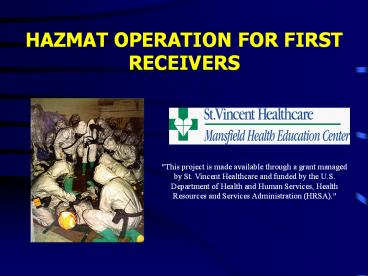HAZMAT OPERATION FOR FIRST RECEIVERS - PowerPoint PPT Presentation
1 / 25
Title:
HAZMAT OPERATION FOR FIRST RECEIVERS
Description:
Plastic bags. Fiberglass long spine board or raven litters. Saw horses ... Contaminated clothes are placed in plastic bag. Do not remove dressings or bandages ... – PowerPoint PPT presentation
Number of Views:784
Avg rating:3.0/5.0
Title: HAZMAT OPERATION FOR FIRST RECEIVERS
1
HAZMAT OPERATION FOR FIRST RECEIVERS
"This project is made available through a grant
managed by St. Vincent Healthcare and funded by
the U.S. Department of Health and Human Services,
Health Resources and Services Administration
(HRSA)."
2
Overview
- Pre-Donning Exam Components
- Primary Hazards of PPE
- Decontaminants
- Equipment and supplies
- Patient Decontamination Procedures
- Termination and Recovery Procedures
- Level C PPE Donning and Doffing Procedure
3
Pre-Donning Exam Components
- Use the Pre/Post Donning Exam Form
- Vital Signs - BP, pulse, respiration rate,
temperature weight - Skin evaluation for rashes, lesions, open wounds
- Mental Status evaluation
- Medical History
- Chronic Illnesses
- Recent Illnesses
- Medications taken within past 72 hours
- Current symptoms of fever, nausea, diarrhea,
vomiting, coughing, wheezing and recent alcohol
consumption.
4
PRIMARY HAZARDS OF WEARING PPE
- Heat Stress
- Slips / Trips / Falls
- Overexertion
- Limited field of vision
5
Decontaminants
- Soap and water
- Adsorbent materials
- Diluted hypochlorite solution
6
Soap and Water
- Ideal for decontaminating chemical substances
- Use liquid soap
- Does not react with any chemical.
- Easy to obtain
- Inexpensive
7
Adsorbent Materials
- Best used on contaminants that reacts to water
- Types
- Earth
- Flour
- Kitty Litter
8
Do not use water to decontaminate
- Magnesium
- Aluminum
- Potassium
- Metallic Sodium
- Lithium
9
Hypochlorite Solution
- Ideal to decontaminate biological agents
- Types
- 1 or 2 sodium hypochlorite (Patients)
- 5 sodium hypochlorite (Equipment)
10
Equipment and Supplies
- Shelter
- Plastic bags
- Fiberglass long spine board or raven litters
- Saw horses or litter stands
- Buckets / sponges / scrub brushes
- Trauma scissors
- Showering devices or water hoses
11
Patient Decontamination Procedures
12
(No Transcript)
13
Decon Station 1
- Assess patient (use decon preliminary charting
form) - Remove contaminated clothing
- Contaminated valuables in plastic ziplock bag and
write patients name on bag - Contaminated clothes are placed in plastic bag
- Do not remove dressings or bandages
14
Clothes Cutting Protocolfor Non-Ambulatory
Patients
15
Decon Station 2
- Wash body using decontaminants
- Flush wounds
- Rinse body with copious amount of water
16
Decon Station 3
- Redress wounds
- Dry off patients
- Clean covering
- Transport to ED
17
Termination Procedures
- Notification of appropriate agencies
- Containment and Security
- Recovery
- Debriefing
- Complete Documentation
18
Notification of Appropriate Agencies
- County Emergency Manager
- Facility Environmental Health Safety Officer
- County Environmental Health Agency
- Department of Fish and Game
- Department of Health Services
19
Containment and Security
- Contaminated clothes
- Personal belongings
- Contaminated water runoff
- Contaminated expendable equipment
- Contaminated durable equipment that will need to
be decontaminated - All contaminated items should be secured until
properly disposed.
20
Recovery
- Decontaminate durable and patient care equipment
- Shelter
- Raven litter or spine board or Gurneys
- Perform team decontamination.
- Discontinue facility lock down.
- Staff monitoring of post-decontamination activity
in collaboration with employee health (use
pre/post donning exam form).
21
Debriefing
- Critical Incident Stress Debriefing for Decon
Team Members - Rapid defusing for staff just
after the incident. - Quick, basic debriefing of Incident Command Staff
before disbanding the command center.
22
Complete Documentation
- Keep good documentation and exposure records.
- Keep essential communications.
- Consider teamwork essential.
- Consider Risk Management, Financial, and
Regulatory Issues.
23
- Level C PPE Donning and Doffing Procedures
24
Summary
? Pre-Donning Exam Components Primary Hazards
of PPE Decontaminants Equipment and
supplies Patient Decontamination Procedures
Termination and Recovery Procedures Level C PPE
Donning and Doffing
25
THANK YOU






























